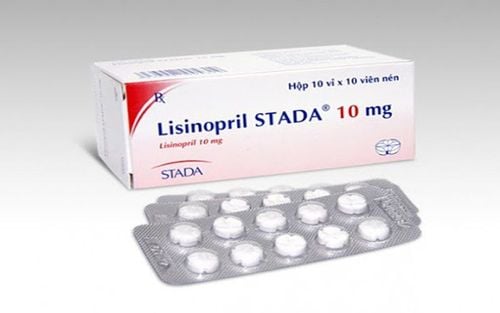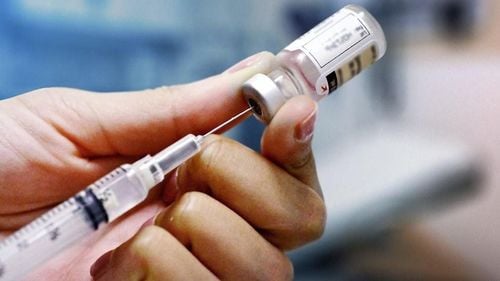This is an automatically translated article.
Baciim drug contains active ingredient Bacitracin - antibiotic against many types of gram-positive and gram-negative bacteria. The drug is indicated in the treatment of pneumonia and some infectious diseases caused by susceptible bacteria. Let's learn about the uses and notes when using Baciim through the article below.
1. Uses of Baciim
“What is Baciim?”. Baciim is prepared in the form of a powder for injection containing the active ingredient Bacitracin. Studies have demonstrated the antibiotic Bacitracin to have a pronounced antibacterial effect in vitro against gram-positive and some gram-negative bacteria. However, for systemic infections, only staphylococcal (Staphylococcus) infections are eligible for treatment with Bacitracin.
Active ingredient Bacitracin after intramuscular injection is quickly and completely absorbed. Doses of 4 to 5 mg/kg every 6 hours resulted in serum concentrations of 0.2 to 2 mcg/mL in patients with normal renal function. Bacitracin is slowly eliminated through glomerular filtration, the drug is widely distributed in the body's organs (both in pleural fluid and ascites fluid after intramuscular injection).
Baciim is indicated for intramuscular injection in the treatment of pneumonia in neonates and edema caused by drug-sensitive staphylococci. To reduce the risk of drug resistance and maintain the efficacy of Bacitracin, the drug should only be considered in patients with a known causative agent susceptible to Bacitracin.
2. Dosage of the drug Baciim
Baciim belongs to the group of prescription drugs, the dose of medicine used is prescribed by the treating doctor, the patient absolutely does not use the drug without the permission of the doctor. Some recommendations on dosage of Baciium in the treatment of bacterial infections in infants are as follows:
Children weighing less than 2.5kg: The dose is 18mg/kg/24 hours divided into 2-3 intramuscular injections; Children weighing over 2.5kg: The dose is 20mg/kg/24 hours divided into 2-3 times intramuscularly. The intramuscular dose should be administered in the upper outer quadrant of the buttocks, alternating left and right, avoiding multiple injections in the same area because of increased pain sensation after injection.
Powder for injection should be mixed in physiological saline solution containing 2% procaine hydrochloride, antibiotic concentration after reconstitution should not be less than 100mg/mL and not more than 200mg/mL. Do not use solvents containing parabens to dissolve Bacitricin.
The drug solution after reconstitution should be checked with the naked eye for transparency, no residue and no color change before use.
Baciim medicine that has not been reconstituted should be stored in the refrigerator at a temperature of 2 – 8oC. The solution after reconstitution is only stable for 1 week, so any remaining dose after 7 days should be discarded.
3. Side effects of Baciim
During the use of Baciim, patients may experience some of the following side effects:Clostridium Difficile-associated diarrhea (CDAD) has been reported with most antibacterial agents, ranging from mild to mild. to colitis, even death. The reason is because Baciim disrupts the balance of bacteria in the intestinal tract, leading to the overgrowth of Clostridium difficile bacteria. As with other antibacterial agents, the use of Baciim increases the risk of overgrowth of non-susceptible microorganisms, including fungi. There have been reports of allergic skin reactions and anaphylaxis in patients exposed to Bactracin in unapproved indications. Renal toxic reactions: Increased blood urea, albuminuria, urinary collapse. Other reactions: Nausea, vomiting, pain at the injection site, dermatitis.
4. Notes when using Baciim
Contraindicated to use Baciim in patients who are allergic to Bacitracin or to any of its ingredients.
Baciim parenteral administration carries the risk of nephrotoxicity (tubular and glomerular necrosis). Therefore, patients on drug therapy should have regular kidney function tests daily, do not exceed the recommended drug dose, maintain water intake and urine output at an appropriate level to avoid nephrotoxicity. . In case of kidney toxicity, the patient should stop taking the drug. Avoid concomitant use of Baciim with nephrotoxic drugs such as Kanamycin, Streptomycin, Polymycin E, Polymycin B, Vancomycin and Neomycin.
Patients should be advised that Baciim in particular and antibiotics for bacterial infections in general are only used in case of bacterial infections. Medicines are not effective in treating viral illnesses (eg, colds). Patients should note that, during the treatment of bacterial infections with Baciim, although symptoms have improved earlier in the course of treatment, the drug should be used strictly according to the treatment regimen. Skipping doses of the drug or not completing the entire regimen will reduce the effectiveness of treatment, increasing the risk of drug resistance of pathogenic bacteria.
Diarrhea is a common problem caused by antibiotics and it ends when the medicine is stopped. In some cases, a person may have loose and bloody stools (with or without stomach cramps, fever), even up to two months after the last dose of antibiotics. If diarrhea is severe, the patient should notify the treating doctor.
5. Baciim drug interactions
Concomitant use of Baciim and the following drugs increases the risk of nephrotoxicity: Vancomycin, Kanamycin, Polymycin E, Streptomycin, Neomycin.
Drug interactions may occur that reduce the therapeutic effect of the drug, increasing the risk of unwanted effects. Patients need to inform the treating doctor of all medicines they are using including prescription drugs, dietary supplements, and over-the-counter drugs before taking Baciim.
Baciim drug contains active ingredient Bacitracin - antibiotic against many types of gram-positive and gram-negative bacteria. The drug is indicated in the treatment of pneumonia and some infectious diseases caused by susceptible bacteria.
Follow Vinmec International General Hospital website to get more health, nutrition and beauty information to protect the health of yourself and your loved ones in your family.
Please dial HOTLINE for more information or register for an appointment HERE. Download MyVinmec app to make appointments faster and to manage your bookings easily.
Reference source: drugs.com













